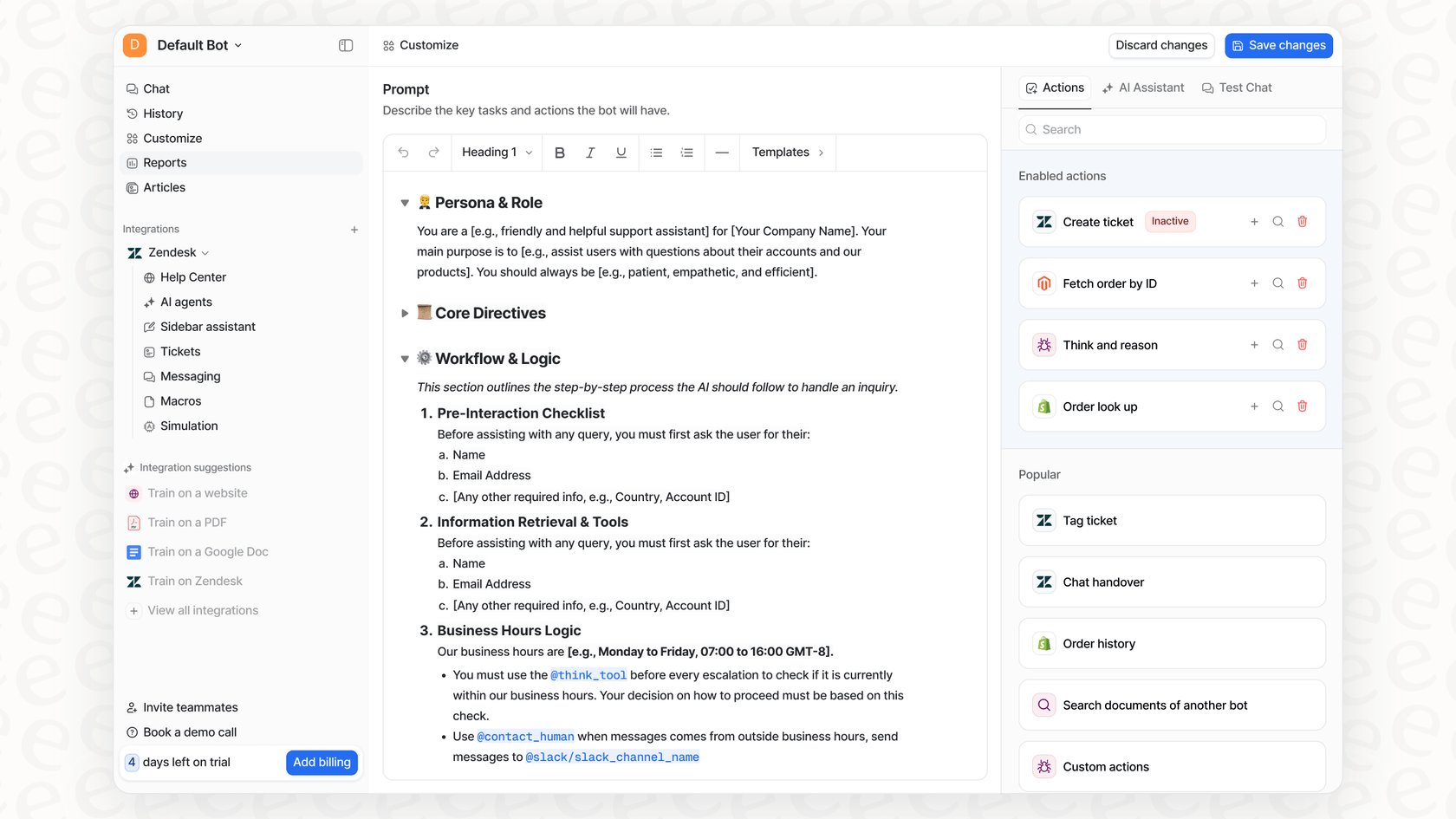
It feels like a new AI model drops every other week, doesn't it? Each one claims to be faster, smarter, or more creative than the last.
But if you're running a business, especially in customer support or IT, the hype doesn't mean much. You're not asking an AI to write a sonnet; you need it to solve a customer's problem. The real question is, how do you get one of these powerful, general-purpose AIs to actually fit into your workflow and understand your company's specifics?
That's what this guide is all about. We’re going to compare Mistral vs Claude from a practical business standpoint. We’ll skip the abstract benchmarks and get straight to their core philosophies, features, and what it really costs to get them working for you.
What are Mistral and Claude?
Let's do a quick intro before we dive deep.
Mistral AI is a Paris-based company that's been getting a ton of attention. Their big thing is open-source models and efficiency. They focus on giving developers and businesses powerful, flexible tools so you have more control over your AI setup.
Claude , from the US company Anthropic, comes from a different angle. Anthropic is focused on AI safety. Claude is known for its solid reasoning, the ability to remember a lot of information in a conversation (thanks to its huge context window), and its "Constitutional AI" training. The whole idea is to build an AI that’s helpful, harmless, and honest, which makes it a go-to for tasks that need a bit more nuance and reliability.
Open source vs. safety-first: What's the real difference?
Before getting into the features, it's worth understanding the different philosophies behind Mistral and Claude. This has a huge impact on how you can (and can't) use them for your business.
Mistral's open and customizable approach
Mistral became popular by releasing some incredibly powerful open-source models. For developers, this is huge. It means you have the freedom to build, tweak, and host your own AI solutions. If you have the in-house technical skills, you can really dig in and customize everything.
Their commercial models, which you can get through their API platform "La Plateforme," give you access to their most advanced tech, like Mistral Large, with a focus on performance and cost-effectiveness.
But here’s the catch: that freedom comes with responsibility. When you use Mistral's API, you're getting a powerful but totally raw engine. You’re responsible for building the entire application around it, from the user interface to the logic that handles specific customer questions or escalates a ticket. That means a serious, ongoing investment in a specialized development team.
Claude's focus on safety and reliability
Anthropic builds Claude with safety as its foundation. They use a unique training method they call "Constitutional AI," where the model learns to follow a set of principles or a "constitution." The goal is to make its answers more predictable and steer it away from generating weird or unhelpful content.
Their models, including the impressive Claude 3.5 Sonnet and Opus, are available through a clean chat interface and a solid API for developers.
And while Claude might feel a bit safer right out of the box, you still run into a similar problem. If you want to plug it into your helpdesk, for example, you still need custom API work. You have to build all the plumbing that lets it do useful things like tag a ticket, check an order status, or know when to pass a conversation to a human.
What this means for your business workflows
So here's the reality for both: you get a powerful API, but not a finished, business-ready product. An effective AI support agent is more than just a smart model; it needs a workflow engine to guide it.
This is the exact gap that a platform like eesel AI is designed to fill. It gives you a no-code workflow engine that sits on top of these top-tier models. This lets you define the AI's persona, tell it exactly what to do (like escalate a ticket or look up customer data in Shopify), and control its knowledge base, all without writing code. You get the brains of a leading model with the practical controls your business needs.

Performance and features in the real world
Both models are fantastic at general tasks, but their usefulness in a business context boils down to how well they can be shaped to your specific needs.
Reasoning and content generation
Both models are brilliant at understanding complicated questions, summarizing long documents, and writing clean text. You'll often hear people praise Claude for its nuanced grasp of language and its ability to process massive documents. Mistral often gets props for its raw speed and efficiency.
But in a customer support setting, that general knowledge can actually be a problem. Neither model knows your company's return policy or how to troubleshoot your latest product. If your AI starts answering customer questions with generic info it found on the web, you’re going to have some unhappy customers.
Coding and technical tasks
Both models are also great at coding, and Mistral even has a specialized model, Codestral, for it. This is great for dev teams. For a customer-facing AI, though, the goal isn't to write code; it's to give accurate support based on your company's information.
A useful AI support agent needs to learn from your business data. That’s what platforms like eesel AI are built for. It connects to your existing knowledge sources, like past support tickets, internal wikis in Confluence or Google Docs, and your public help center, to learn instantly. This makes sure every answer is relevant, accurate, and sounds like it's coming from your brand.

The pricing model: What's the real cost?
The API pricing you see on their websites is just the tip of the iceberg. The real cost includes all the resources you'll need to build, launch, and maintain a custom solution around that API.
Mistral pricing explained
Mistral’s platform, "La Plateforme," has a pay-as-you-go model based on "tokens" (think of them as pieces of words). Their top model, Mistral Large, costs $3 per million input tokens and $9 per million output tokens. While it seems cheap, this cost can be unpredictable and add up fast, making it tough to budget for.
But the real cost isn't the API fee. It's the months of developer salaries you’ll pay to build a solid application, plus the infrastructure costs to host it and the ongoing maintenance to keep it running. You could easily spend tens or even hundreds of thousands of dollars before it does anything useful.
Claude pricing explained
Claude has a Pro plan for individuals at $20/month, but for any real business application, you’ll be using their API, which also has a token-based model. Their best model, Claude 3.5 Opus, is currently priced at $15 per million input tokens and $75 per million output tokens.
And just like with Mistral, turning that powerful API into a working support agent is a big engineering lift. The money you spend on developers, infrastructure, and upkeep will likely be far more than what you pay for the API itself.
A simpler approach to AI implementation
For most companies, a predictable, all-in-one solution just makes more sense.
Instead of guessing your monthly token usage, a tool like eesel AI offers straightforward subscription plans with no surprise fees. The cost of the AI model, the no-code workflow builder, all the integrations, and maintenance are bundled into one predictable monthly price.
Even better, since eesel AI is a self-serve platform with one-click integrations for helpdesks like Zendesk and Intercom, you can get a powerful AI agent up and running in minutes, not months. This massively cuts down the total cost and gets you a return on your investment way faster.
| Feature | Mistral / Claude (via API) | eesel AI |
|---|---|---|
| Pricing Model | Pay-per-token (unpredictable) | Flat monthly fee (predictable) |
| Setup Time | Weeks or months | Minutes |
| Required Skills | Specialist engineers, DevOps | No code needed |
| Key Cost | API fees + developer salaries + infrastructure | One subscription fee |
Mistral vs Claude: Which one is right for you?
So, what's the final word in the Mistral vs Claude debate?
Mistral is a great pick if you have a team of skilled engineers and want total control to build a custom AI application from the ground up.
Claude is a brilliant choice for tasks that need sophisticated reasoning and a high degree of safety, assuming your team is ready to do the API integration work.
But for most businesses looking to improve customer or IT support, here’s the bottom line: both Mistral and Claude are powerful ingredients, but they aren't the whole meal. The time, money, and expertise needed to build a reliable, integrated, and smart agent from scratch are huge.
This video explores how Mistral's latest model stacks up against competitors like Claude 3.7, offering more insights into the Mistral vs Claude performance debate.
If your goal is to automate support and help your team without starting a massive, expensive engineering project, then a specialized platform is the way to go. A tool like eesel AI lets you use the power of these advanced AI models, but trained on your own data and plugged directly into your existing tools. You get to see a real impact from day one.
Frequently asked questions
Mistral focuses on open-source flexibility and efficiency, giving developers more control over their AI setup. Claude emphasizes safety, strong reasoning, and large context windows, making it suitable for nuanced tasks that require reliability.
The real cost goes far beyond API tokens, encompassing significant developer salaries, infrastructure, and ongoing maintenance. Both Mistral and Claude require substantial engineering investment to build a useful, integrated business application from scratch.
Both Mistral and Claude require custom API work and building an entire application around their core models for specific business workflows. This means a significant investment in a specialized development team and considerable time for setup.
Claude, with its "Constitutional AI" training and focus on safety, is often preferred for tasks needing high reliability, nuanced understanding, and predictable output. Mistral offers raw power and efficiency, which can be tailored by expert teams for specific needs.
While both models are powerful, training them on proprietary company data requires significant custom engineering to connect them to your knowledge bases effectively. A dedicated platform like eesel AI is usually needed to make this process efficient and accurate.
Yes, specialized platforms like eesel AI offer a no-code workflow engine that sits on top of these models. This allows businesses to configure advanced AI agents with integrations and custom knowledge bases in minutes, without a large engineering team.
Share this post

Article by
Stevia Putri
Stevia Putri is a marketing generalist at eesel AI, where she helps turn powerful AI tools into stories that resonate. She’s driven by curiosity, clarity, and the human side of technology.






